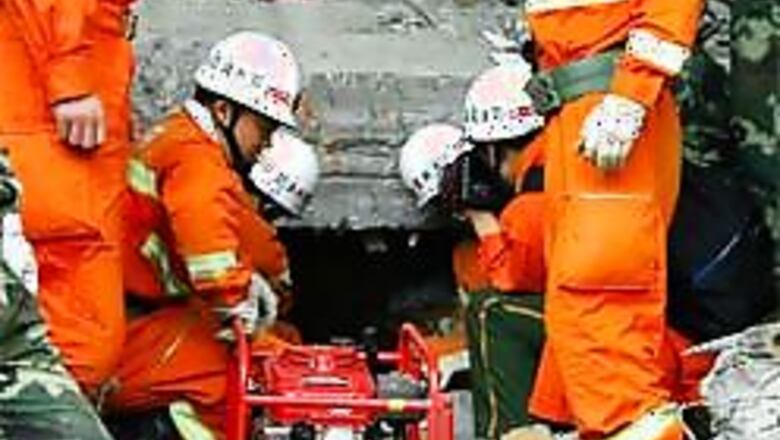
views
Beichuan: Thousands of Chinese earthquake victims fled areas near the epicenter on Saturday, fearful of floods from rivers blocked by landslides rattled loose in this week's powerful temblor.
Soldiers carried older people out of Beichuan town - one of the areas hit hardest by the magnitude 7.9 quake on Monday - while survivors cradled babies on a road jammed with vehicles and people.
A policeman said rescue officials were worried that water from a choked river would inundate the town.
"The river was jammed up by a landslide, now that may burst. That is what we are worried about," the policeman said as he hurried by, not giving his name.
"I'm very scared. I heard that the water will be crashing down here," said Liang Xiao, one of the people fleeing. "If that happens, there will be over 10 yards of water over our heads."
The official Xinhua News Agency said earlier that a lake in Beichuan County "may burst its bank at any time," but did not give details on why the water was rising. Residents left homes for higher ground, but 46 seriously injured were still at risk, the agency said.
Farther north, a mountain sheared off by the quake cut the Qingzhu River and smothered three villages in a valley near Qingchuan town. No traces remained of the villages, swallowed up by a huge mound of earth behind which the cut-off river's waters were backing up.
Xinhua said more than 2,000 people were being evacuated near Qingchuan.
Rain began to fall in Qingchuan County on Saturday evening for the first time since the initial quake, the agency reported - increasing the risk of floods and more building collapses, and worsening living conditions for homeless survivors sheltered under tents and makeshift canopies.
The confirmed death toll rose on Saturday to 28,881, Cabinet spokesman Guo Weimin said.
But more than 10,600 people remained buried in Sichuan province, Xinhua reported, and the government has previously said at least 50,000 people were believed killed in the disaster.
Survivors still were being found under destroyed buildings five days after the quake. A 52-year-old man buried in the ruins for 117 hours was pulled to safety in Beichuan, Xinhua reported. Two other survivors were later found alive 120 hours after the quake elsewhere in Sichuan, the agency said.
PAGE_BREAK
Rescuers worked through the day - using saws, drills and their hands - to free a woman pinned under a crumpled six-story apartment building in Longhua town after 124 hours in the rubble, a day after another person was pulled alive from the same place.
Covered in mud and dust, 31-year-old Bian Gengfeng was taken away by medics who covered her eyes with a towel.
Bian's 10-year-old daughter watched the rescue.
"Uncle called me yesterday and said Mom was alive and I should come and wait here," said Luo Ting.
The man pulled from the rubble the day before prompted the rescue, telling rescuers that he had been talking with a woman trapped in the building that had been housing for chemical workers.
The vast majority of survivors are rescued in the first 24 hours after a disaster, with the chances of survival dropping each day, said Dr. Irving "Jake" Jacoby of the University of California, San Diego, who heads a medical assistance team that responded to a 1989 earthquake in California, Hurricane Katrina and other disasters.
A person trapped but uninjured could survive a week or even 10 days and in extreme circumstances two weeks or more, he said.
Rescue teams from South Korea, Singapore and Russia began work Saturday. They joined a Japanese specialist group, which was the first international rescue crew to arrive in the disaster area after China dropped its initial reluctance to accepting foreign personnel.
A U.S. Air Force cargo plane loaded with tents, lanterns and 15,000 meals left Hawaii on Saturday, the first aid flight from the United States to help in Sichuan province. Another Air Force delivery was to fly in from Alaska.
Secretary of State Condoleezza Rice expressed sympathy over the tragedy to Chinese Foreign Minister Yang Jiechi during a Saturday phone call and said Washington was ready to give further support, the Chinese Foreign Ministry said in a statement.
The United Nations announced a grant of up to $7 million from its Central Emergency Response Fund, to be used by U.N. agencies and programs.
Aftershocks continued, also shaking President Hu Jintao as he praised rescue workers during a tour of the destruction.
PAGE_BREAK
"You carried out the order of the party, government and the central military committee determinedly. You contributed to the relief efforts," Hu told troops in Wenchuan county before the shaking prompted him to pause and glance over a hill before he went on, "despite difficulty, weariness and harshness."
The government has not given a figure for the number of people left homeless, but Housing Minister Jiang Weixin said more than 4 million apartments and homes were damaged or destroyed in Sichuan province. He said the water supply situation was "extremely serious" in Sichuan, and not flowing at all in 20 cities and counties.
Caring for the untold tens of thousands or more survivors across the earthquake zone was stretching government resources.
Just north of the provincial capital of Chengdu, the town square in Shifang had become a tent camp for 2,000 people, and coordinator Li Yuanshao reported a lack of tents. Many people walked in from surrounding towns with few belongings.
"We brought almost nothing, only the clothes we are wearing," said Zhang Xinyong, a high school junior who walked several hours to the camp.
The Ministry of Health said there had been no major outbreaks of epidemics or other public health hazards in the earthquake area, according to Xinhua. By late Friday, hospitals in Sichuan had received 116,460 patients, including nearly 16,000 severely injured.




















Comments
0 comment